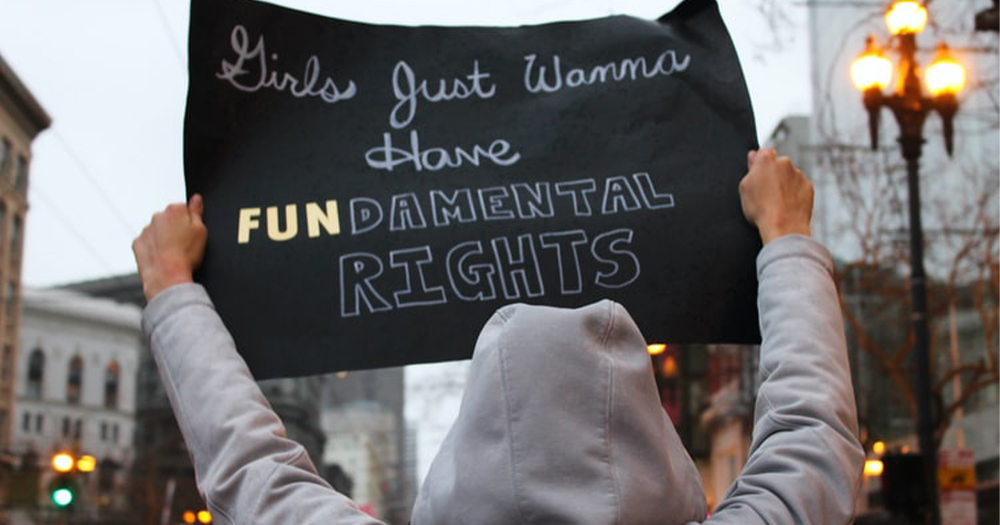Transfeminism has been defined by academic and activist Emi Koyama as “a movement by and for trans women who view their liberation to be intrinsically linked to the liberation of all women and beyond.” However, transfeminism is for everyone and Koyama herself notes that the movement is open to people from all genders who “consider their alliance with trans women to be essential to their own liberation”.
Transfeminist activists follow the principles of intersectionality. Kimberlé Crenshaw, the law professor who first introduced the concept, describes intersectionality as a lens for understanding how various forms of inequality operate together and exasperate each other.
In the context of transfeminism, intersectionality means recognising the interplay between transphobia and misogyny in creating specific challenges for trans women and transfeminine people. This issue is sometimes referred to as ‘transmisogyny’, a term coined by writer Julia Serano in her seminal transfeminist work, Whipping Girl.
Intersectionality also means looking at factors that may leave some communities of trans women more at risk than others. According to Koyama, the issues of racism and classicism, in particular, are compounded by transphobia. Transfeminism is about tackling all forms of transmisogyny, particularly for those who are most disadvantaged.

Violence against trans women is one of the biggest concerns for the transfeminist movement right now. 350 trans people were killed in 2020 and 98% of the victims were women or transfeminine people. These figures demonstrate the clear prevalence of gender-based violence in transphobic hate crimes.
Racism also plays a major part in transphobic violence. Of the transgender people murdered in Europe in 2020, 50% were migrants, while in the US, nearly 80% of the victims were people of colour. The Biden-Harris administration has pledged to tackle what is being described as an epidemic of violence against trans women of colour in America.
Despite the effect of misogyny on transfeminine people, women’s rights organisations are not always trans-inclusive. A recent report by gal-dem revealed that transphobia was rife in the gender-based violence sector in Britain. This hostility has lead to the exclusion of transgender women from vital services such as domestic violence refuges and supports for survivors of sexual abuse. This trend is particularly concerning given that multiple studies have shown that trans women are twice as likely as cis women to experience sexual violence.
The report identifies this issue as being a part of the broader rise of transphobia in certain factions of British feminism. So-called TERFs, or Trans-Exclusionary Radical feminists, attempt to gatekeep women’s spaces and the identity of womanhood in general. This is in direct contradiction to the values of transfeminism and, as is outlined in the report on the gender-based violence sector, can contribute to the exasperation of transmisogyny.

In Ireland, the situation is looking more hopeful. Director of the National Women’s Council, Orla O’Connor, recently spoke out on Twitter against those trying to “drive a wedge between trans rights and women’s rights” and highlighted the need for oppressed groups to stand together.
Furthermore, at the end of January this year, TENI and the RCNI announced they were partnering together to ensure that services for survivors of sexual violence “continue to be safe, caring and affirming places for trans survivors”. The creation of inclusive spaces that accommodate the specific needs of the trans community and all marginalised groups is a central goal for transfeminist activists.
TENI and @RCNIreland are working together to ensure world class counselling for all survivors of sexual assault. We will continue to work alongside RCNI to support and ensure trans people are always treated with affirming care and practical knowledge and understanding. pic.twitter.com/PqDNO1kT9g
— TENI (@TENI_Tweets) January 26, 2021
While gender-based violence is one major area of concern, the transfeminist movement is dynamic and diverse. Transfeminism is relevant to a wide range of issues, from anti-racism to healthcare, housing, labour rights and more. In the words of activist and writer Pauline Park, “there will inevitably be as many varieties of trans feminism as there are trans feminists . . . trans feminism is as trans feminism does”.
© 2021 GCN (Gay Community News). All rights reserved.
Support GCN
GCN has been a vital, free-of-charge information service for Ireland’s LGBTQ+ community since 1988.
During this global COVID pandemic, we like many other organisations have been impacted greatly in the way we can do business and produce. This means a temporary pause to our print publication and live events and so now more than ever we need your help to continue providing this community resource digitally.
GCN is a registered charity with a not-for-profit business model and we need your support. If you value having an independent LGBTQ+ media in Ireland, you can help from as little as €1.99 per month. Support Ireland’s free, independent LGBTQ+ media.

comments. Please sign in to comment.